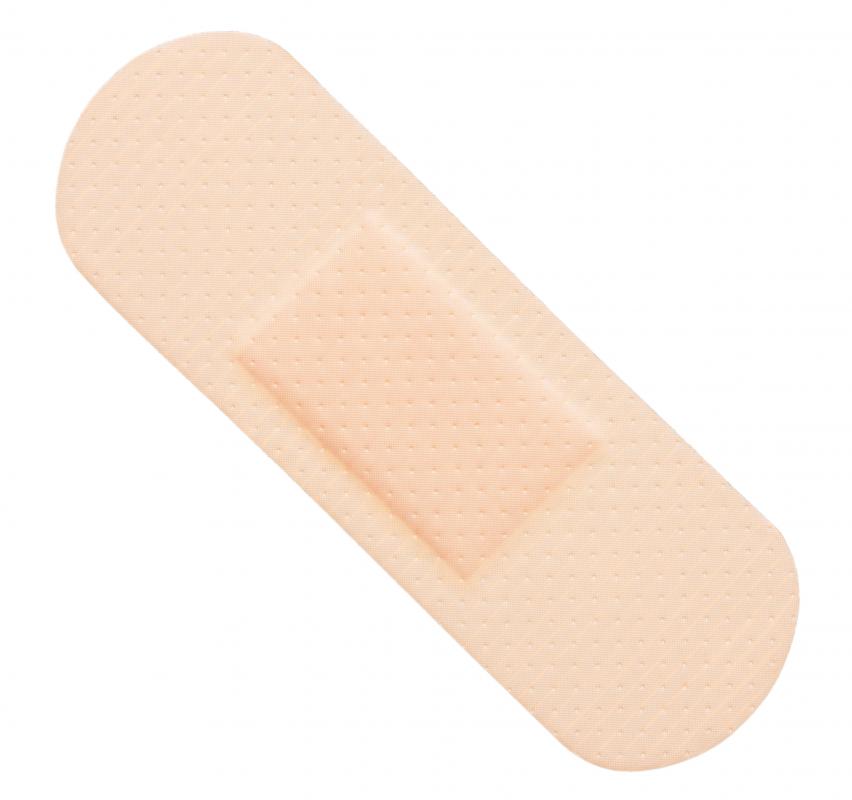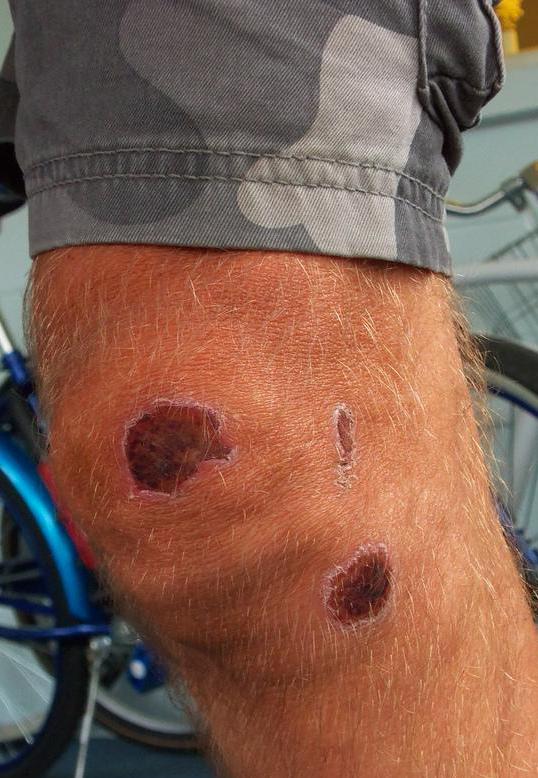At TheHealthBoard, we're committed to delivering accurate, trustworthy information. Our expert-authored content is rigorously fact-checked and sourced from credible authorities. Discover how we uphold the highest standards in providing you with reliable knowledge.
How Should I Treat a Skin Abrasion?
Skin abrasions, also known as scrapes, are commonly caused by falls or accidents and usually occur on the hands, elbows, knees and shins. They typically tear off some skin, so it's important to treat them immediately. Some scrapes are shallow, and some rub off several skin layers. Deeper wounds might require a doctor’s care, but minor scrapes typically can be treated at home. Learning how to treat a skin abrasion is easy to do by following the simple steps of assessing the depth, cleaning the wound and aiding the healing process.
Skin abrasions typically don’t bleed very much and might ooze with a pink fluid. They typically are more painful than a simple cut because they expose nerve endings and take off more skin. Scrapes are more common in warmer months because more skin is exposed and less protected, so be sure to keep medicine available to treat a skin abrasion during the spring and summer seasons. Children typically have more skin abrasions because they tend to run and play more than adults, increasing their chances of collisions with carpet, pavement and other surfaces.

When someone has a scrape, the first thing to do is to stop the bleeding by applying pressure directly to the wound. Once the bleeding stops, look to see how badly and deeply the skin is wounded. If it’s a minor scrape, then you can treat then skin abrasion yourself. Clean the area thoroughly with soap and water, then rinse it with an antiseptic such as hydrogen peroxide to prevent infection.

Treat a skin abrasion with a triple antibiotic ointment that has bacitracin, neomycin and polymyxin B. These antibiotics will help to prevent infection and scarring, and they usually speed up the healing process. Cover the wound loosely with a bandage to block dirt from entering the wound. Many people also consider going for a tetanus shot at this point, if the scrape occurred with metal or anything rusty.

No matter how you treat a skin abrasion, they typically heal at different speeds. Many minor scrapes will heal within a week, but larger skin abrasions can take up to two weeks to heal. Seeing some fluid drain from a skin abrasion is normal, as long as the wound is not infected. If the fluid changes color or emits an odor, have a doctor check to make sure the wound is not infected.

The scrape will begin to heal on its own, and a scab usually will form. Keep the area clean and treat it with antibiotic ointment at least once a day. New skin tissue will begin to form at the inner layers of the wound and move its way to the surface. When the skin abrasion heals, the scab will come off on its own.
AS FEATURED ON:
AS FEATURED ON:

















Discussion Comments
I over scraped the skin on my heels. It hurt really bad for a couple of days. But now it looks like I have white blisters. They don't hurt. I'm not sure what to put on them. There is no pus.
I have an abrasion from when I fell while playing netball. I have washed the wound and put a band-aid on it after drying the wound. However, when the epidermis grows back, it produces pus and sticks to the band aid, causing the epidermis to be torn off from the wound. As the injury is at my elbow area, I have no choice but to put on a band-aid or friction will then cause the wound to open up again. What should I do?
I have an abrasion when I fell while playing netball. I have washed the wound and put a band-aid on it after drying the wound. However, when the epidermis grows back, it produces pus and sticks to the band aid, causing the epidermis to be torn off from the wound. As the injury is at my elbow area, I have no choice but to put a band-aid or friction will then cause the wound to open up again. What should I do?
I have had multiple knee and elbow abrasions, because I spend a lot of time roughhousing outdoors with my big dogs. They play a bit too rough at times, and I wind up getting dragged across the ground.
Treating the areas in the beginning is no problem. The issue I have arises once the abrasions start to heal.
When scabs form, it is a sign that the skin is healing. However, this healing process causes a lot of itching.
It is so hard to keep from picking at the scab, because the itch seems to be underneath it, and I just can't get to it. I know that I will prolong the healing process if I mess with the scab, so it takes a lot of self-control.
Treating abrasions burns a little, even if you only use a mild soap and water. I've even tried rinsing the area with water alone, and it still burns.
If I can no longer see any dirt in the abrasion, I know it is safe to apply antibiotic ointment and a bandage. After the first couple of days, I try to spend a few hours a day without the bandage so that the wound can heal more quickly. It needs a bit of air to repair itself.
@Oceana – To me, hydrogen peroxide doesn't burn as badly as alcohol. If the abrasion is small, then it sometimes doesn't produce any pain at all.
I like watching it bubble up on my skin, because it is a sign that it is cleansing the wound. The bubbles look like suds, and they quickly dissipate into a white patch that remains for awhile.
On larger abrasions, you might feel some stinging with peroxide, but I still think it won't hurt as much as alcohol will. I don't even bother keeping alcohol in my medicine cabinet.
The item in my first aid kit that burns the most is rubbing alcohol. I use it whenever I get a scrape, and I always dread the pain that immediately follows.
I know that it's getting the dirt and germs out, but I can hardly bear the searing burn! Is there something that will hurt less but that can still disinfect the area?
@anon297367 - Foot wounds are the worst when it comes to healing, particularly if they are at all deep, because the feet are exposed to more bacteria than most other body parts and are constantly being put under pressure as well.
So, she was probably trying to give you the best chance possible to avoid infection and let your heel heal quickly.
I was jabbed in the big toe a few months ago with a toothpick and it took weeks and weeks to heal, because it got infected. I usually don't have any trouble healing at all, but because it was on my foot it just wouldn't go away. Better not to take any risks with that kind of injury and go to the trouble of preventing infection, rather than battling it later on.
@Littleman - You might want to try using something like Bepanthen, which is used as a baby rash cream and on cracked nipples when women are breastfeeding, so I know it's safe to ingest in small amounts.
It's really good at clearing up small cuts quickly and will protect your wound better than just using Vaseline will.
However, unfortunately, there's not much else you can do aside from trying to use your mouth as little as possible over the next few days. Drink through a straw, try not to talk too much and apply the cream religiously to your lip abrasion and hopefully it will get to the point where it won't open so much.
I recently got a long cut on my heel from a heavy metal door and I wanted to know why the nurse cleaned the wound and covered it with the skin that did not detach and protected it with gauze and medical tape. She also told me to keep it dry for seven days. I am a teen, by the way.
Can you tell me whether topical first aid applications like Neosporin (or similar gels) are really effective when it comes to treating skin abrasions? My daughter loves to play outside, and she's recently gotten into rollerskating.
Unfortunately, that means a lot of scraped knees and elbows are happening around our house. I really want to choose the best product to keep her from scarring.
I was also going to ask, should I get my daughter a tetanus shot, or do you think she will be OK? There's no metal (that I know of) in our driveway, but I'm still a little leery since she is falling down so much lately.
What do you think? I am really up on my first aid for burns, but with scrapes I'm not so good -- can you advise me?
Could you give me some tips on treating a lip abrasion? In one of those "you couldn't do it if you tried" situations, I managed to run myself into a door and scraped my lip.
The abrasion kind of runs from the middle of the lip to the right side, and a little bit onto my cheek. I've been putting Vaseline on it, but I can't really put a Band-Aid on my lip to protect it, and it keeps coming open again.
Do you have any tips as to what I should do? I'm tired of tasting blood all the time!
When I was younger, I was working at a camp refinishing their bunk beds, and got a nasty chemical burn from the varnish remover.
I accidentally spilled some on my jeans, but didn't realize it until I started to feel my skin itch -- that night the burn was totally apparent.
However, when I went to the first aid center, they actually used the same treatment that you use for skin abrasions -- turns out that a lot of the tactics that work for skin abrasions are also good burn treatment.
So if you ever get into a situation like that, by all means use regular burn first aid -- but keep in mind basic skin abrasion treatments as well. Both are extremely helpful in treating a chemical burn.
Post your comments